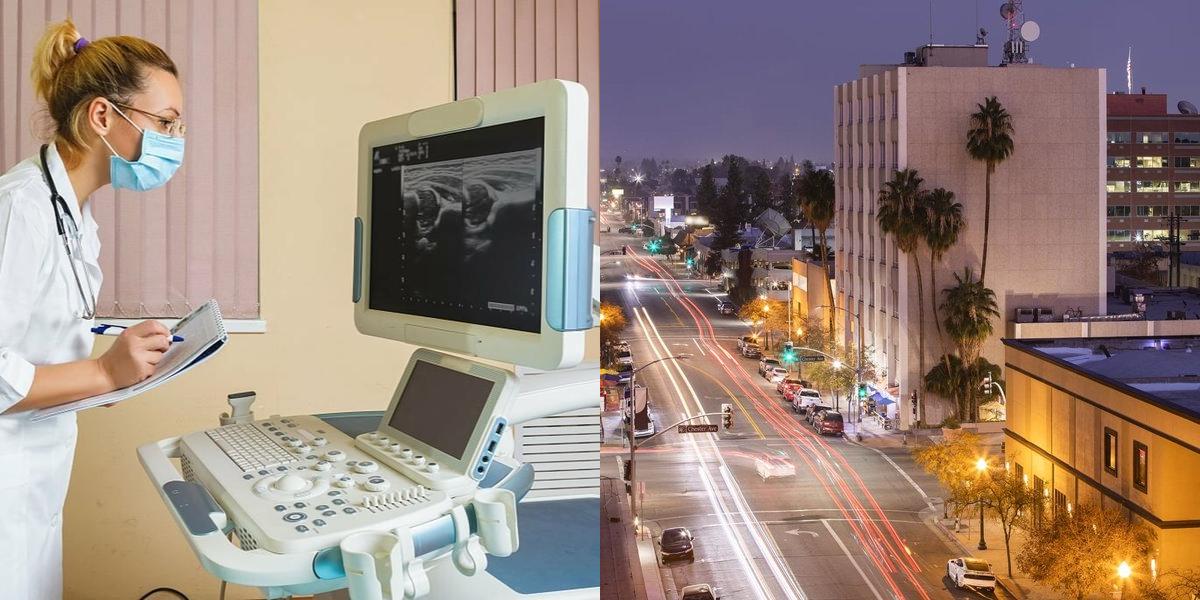Key Points
- California sonographers earn $118,950 per year
- Choose a certificate, associate, or bachelor’s degree in sonography.
- Programs take 18–27 months for a certificate or degree.
- ARDMS certification is the industry standard required by most employers.
- All accredited programs include supervised clinical rotations.
What a Medical Sonographer Does
Medical sonographers use specialized ultrasound equipment to create images of the body's organs, tissues, and blood flow. These images help physicians diagnose and monitor medical conditions. Daily tasks often include:
- Preparing patients for procedures and explaining the process
- Operating and adjusting ultrasound machines to capture clear images
- Analyzing images to ensure their quality and completeness
- Documenting findings and managing patient records
- Assisting physicians during biopsies and other guided procedures
Sonographers are essential members of the diagnostic imaging team in any healthcare setting.
Step 1: Complete an Accredited Sonography Program
The first step is to graduate from a diagnostic medical sonography program. Most programs take between 18 and 27 months to complete. Your main options include:
- Certificate Programs (18+ months): The fastest path for those who already have prerequisite college credits or a degree.
- Associate Degree (2 years): The most common educational path for sonographers.
- Bachelor's Degree (4 years): Includes general education and prerequisite courses, often preparing you for leadership or specialized roles.
Choose a program accredited by the Commission on Accreditation of Allied Health Education Programs (CAAHEP). Graduating from a CAAHEP-accredited program is the most direct way to become eligible for professional certification.
Explore Sonography Programs Near You
If you're ready to begin, compare medical sonography programs available through Dreambound:
These pages help you compare costs, schedules, program length, and student reviews so you can choose the best path for your goals.
Step 2: Gain Supervised Clinical Experience
All accredited sonography programs include supervised clinical experience, often called clinical rotations. This hands-on training takes place in hospitals, imaging centers, and specialized clinics.
During your clinical hours, you will work alongside experienced sonographers, practice scanning real patients, and learn to operate different types of ultrasound equipment. This experience is essential for building the skills and confidence needed to work independently after graduation.
Some ARDMS certification pathways require a minimum of 1,680 hours of clinical experience, which is typically fulfilled during your accredited program.
Step 3: Earn ARDMS Certification
While California does not have a state-specific license for sonographers, virtually all employers require certification from the American Registry for Diagnostic Medical Sonography (ARDMS). To earn the primary credential, Registered Diagnostic Medical Sonographer (RDMS), you must pass two exams:
Required exams:
- Sonography Principles and Instrumentation (SPI) Exam: This exam covers the physics and technical principles of ultrasound.
- Specialty Exam: You must also pass at least one specialty exam in an area like Abdomen (AB), Obstetrics & Gynecology (OB/GYN), Breast (BR), or Vascular Technology (VT).
You must pass both your SPI and specialty exam within a five-year window to earn your credential. Graduating from a CAAHEP-accredited program is the most common way to meet the prerequisites for taking these exams.
Step 4: Find a Sonography Job in California
With a strong job market, California offers excellent opportunities for certified sonographers. Employment is projected to grow 24.1% between 2022 and 2032, with an estimated 7,060 total job openings during that period.labormarketinfo.
Common workplaces include:
- Hospitals and medical centers
- Outpatient imaging centers
- Physician offices and private practices
- Specialized clinics (e.g., maternal-fetal medicine, cardiology)
- Mobile imaging services
With your degree and ARDMS certification, you will be qualified to apply for positions across the state's large healthcare networks and independent clinics.






